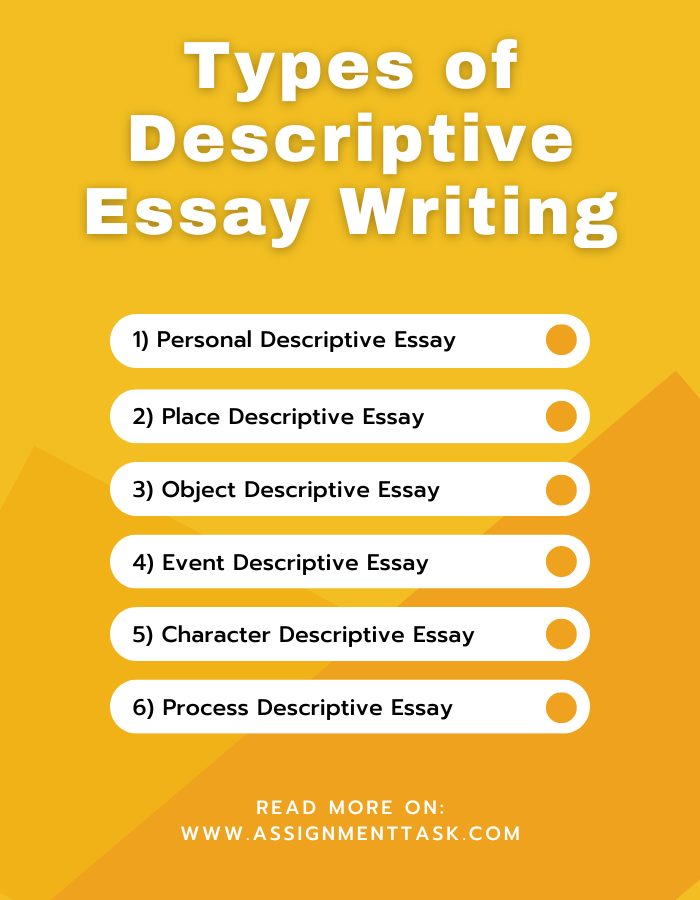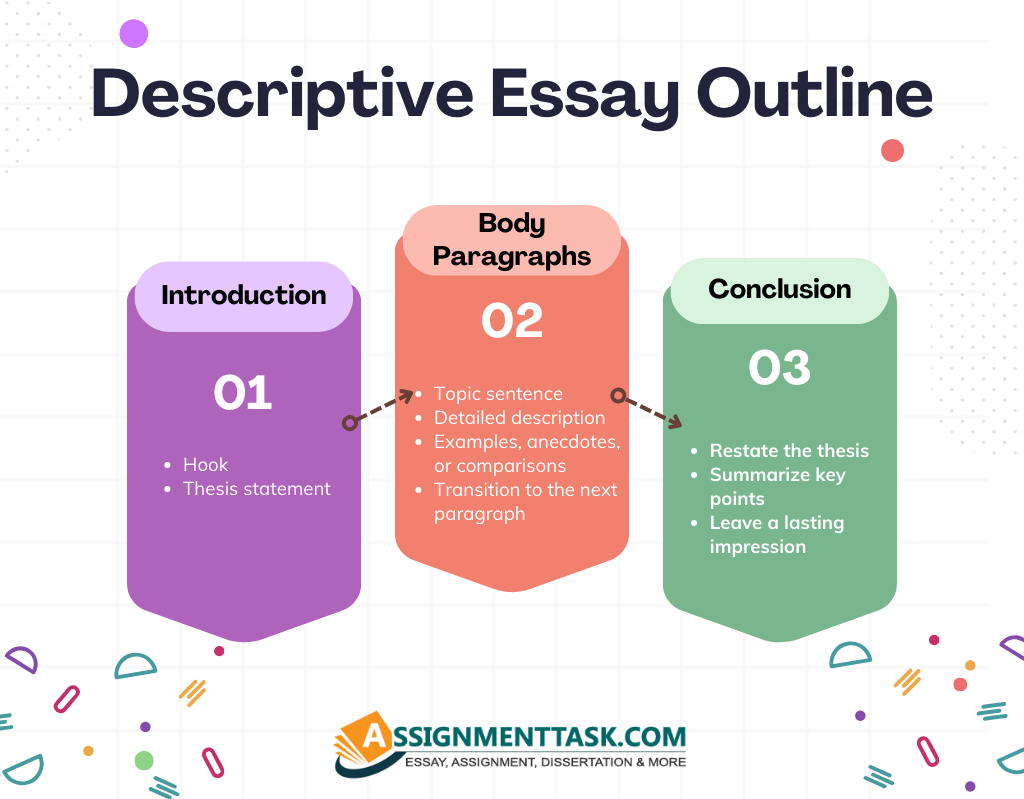How to Write a Descriptive Essay
- Assignment Task Blog
- Dec 12, 2023
- Essay Writing
Descriptive essays, these days, are an important part of academics in higher studies. They serve the essential purpose of enhancing communication and storytelling in the students. Also, these essays make the readers immerse themselves in the writer's experiences or descriptions. They sharpen the students’ ability to convey impactful details and create a strong emotional connection with the audience. Descriptive essays are valuable in literature, journalism, and personal expression.
So, if you are looking for a complete descriptive essay guide and want to know some effective essay format writing tips, then you are at your destination. AssignmentTask brings the most detailed descriptive essay guide that every student worldwide must read.
What is a Descriptive Essay?
A descriptive essay is an academic or creative writing that richly portrays a person, place, object, or experience. It uses physical details, intense language, and careful organization to create a clear and immersive mental picture for the reader. It lets the readers feel as if they are experiencing the subject themselves.
Descriptive writing usually entices the five senses: taste, touch, smell, hearing, and sight. This kind of writing needs to be always appealing to the senses, which is the key to writing a good descriptive essay.
Need Help For Crafting a Vivid and Captivating Descriptive Essay? Hire Experts!
What are the Types of Descriptive Essay Writing?
There are different types of essays you must know before you start writing with us at Assignmenttask.com.
-
Personal Descriptive Essay: This type of essay focuses on describing a particular person, often yourself or someone you know well. It explores the subject's physical appearance, personality, emotions, and personal experiences.
-
Place Descriptive Essay: This category of essay includes a detailed description of a specific location, such as a city, a natural landscape, a room, or any place of significance. The goal is to transport the reader to that place through detailed sensory descriptions.
-
Object Descriptive Essay: This essay centers on a particular object, which could be a simple everyday item or something with personal or historical significance. The writer highlights the object's physical attributes, purpose, and any emotional or cultural value it holds.
-
Event Descriptive Essay: These essays capture the essence of an event, whether it's a celebration, a historical moment, or a personal experience. The writer conveys the atmosphere, emotions, and details surrounding the event.
-
Character Descriptive Essay: This type focuses on describing a fictional or real character, whether from literature, film, or real life. The writer examines the character's personality traits, motivations, and their role in a story or society.
-
Process Descriptive Essay: In this type of descriptive essay, you break down a process or a sequence of steps, explaining how something is done or how it works. The goal is to provide a clear, informative description to the reader.
Each type of descriptive essay serves a different purpose and requires a unique approach to convey the subject's details and significance effectively. Writers choose the type that best suits their subject and the message they wish to convey.
How to Start a Good Descriptive Essay?
Starting a good descriptive essay always needs the writer’s substantial time and some brainstorming for details. These involve several key points:
-
Choose a compelling topic: Select a subject that you are passionate about and can describe in detail.
-
Brainstorm details: Think about the specific aspects, features, or characteristics you want to highlight in your essay.
-
Create an outline: Organize your ideas and details logically. Determine the order in which you will present them.
-
Write a captivating introduction: Begin with a hook or an engaging opening sentence that grabs the reader's attention and introduces the topic.
-
Use sensory language: Include powerful physical details like sights, sounds, smells, tastes, and textures to paint a clear picture of the main protagonist for the reader.
-
Show, don't tell: Instead of stating facts, demonstrate them through descriptive language and examples.
-
Organize your essay: Arrange your details coherently and systematically, such as spatial or chronological order.
-
Conclude effectively: Sum up the main points and leave a lasting impression on the reader.
Following these factors, you can make your descriptive essay, in any form, compelling.
How to Write a Descriptive Essay Outline?
When contemplating descriptive essay writing, keep in mind that a well-structured outline is your key to success. It not only assists in organizing your ideas but also enhances the overall flow of your essays. For more details on how to write a descriptive essay, visit AssignmentTask to hire brilliant writers.
Outline for a Descriptive Essay:
Introduction
- Hook
- Thesis statement
Body Paragraphs (usually 3-5)
- Topic sentence
- Detailed description with sensory language
- Examples, anecdotes, or comparisons
- Transition to the next paragraph
Conclusion
- Restate the thesis
- Summarize key points
- Leave a lasting impression
An outline is crucial in a descriptive essay as it serves as a roadmap, ensuring logical organization and smooth transitions between ideas. It helps writers plan their content, maintain focus, and create a clear, rich, and intense portrayal of the subject. Thus, the outline helps enhance the overall quality and impact of the essay.
Also Checkout: 100+ Best Conclusion Starters for Academic Papers
Descriptive Essay Examples
Some of the examples of Descriptive Essays are here by our expert writers, which you can take as descriptive essay help by AssignmentTask:
1. The Serene Beach
"The golden sands stretched endlessly, meeting the calm, azure waves that whispered secrets to the shore. Seagulls danced overhead, and the sun's warm embrace enveloped every visitor."
2. A Grandmother's Kitchen
"The kitchen was a sanctuary of comforting aromas. The scent of freshly baked apple pie, mingled with the richness of coffee brewing, embraced all who entered, evoking a sense of home and love."
3. A Winter's Morning
"The world outside my window was a monochrome masterpiece. Snow-covered trees glistened in the early morning light, and the silence was broken only by the crisp, crunching sound of footsteps in the snow."
These examples demonstrate how descriptive essays bring scenes, experiences, or emotions to life through rich and detailed language. Please get in touch with us anytime for other examples to analyze and understand essay writing.
How to Find Descriptive Essay Topics?
Finding descriptive essay topics is not hard. You can describe anything—from your favourite car to today’s weather. We have gathered some ideas to help you get started. Hope you get a good descriptive essay topic idea that sparks your imagination here.
It is quite an enjoyable process with these key points:
-
Personal Experiences: Draw inspiration from your memories, such as a memorable trip, a special place, or a significant event.
-
Observation: Explore the world around you and describe everyday scenes, people, or places.
-
Emotions and Feelings: Write about love, fear, joy, or anticipation and describe how they manifest in different situations.
-
Nature and Scenery: Depict the beauty of natural landscapes, the changing seasons, or specific elements like forests, beaches, or mountains.
-
Art and Culture: Explore art forms, cultural celebrations, or historical sites that fascinate you.
-
Objects: Focus on a particular object that holds personal significance or has an interesting history.
-
People and Relationships: Describe a family member, friend, or a significant person in your life.
-
Fantasy and Imagination: Create a descriptive essay based on a fictional setting or character from your imagination.
-
Historical Places or Events: Write about historical sites, events, or figures that intrigue you.
-
Favourite Food or Recipe: Describe the taste, aroma, and cultural significance of a favourite dish.
-
Personal Challenges: Reflect on personal growth, overcoming obstacles, or a life-changing experience.
-
Animals and Pets: Portray the characteristics and unique qualities of a beloved pet or a specific animal.
-
Urban Exploration: Explore city streets, neighbourhoods, or landmarks with special allure.
-
Music and Art: Describe the emotions and imagery evoked by a particular song, piece of art, or artist.
-
Dreams and Aspirations: Share your hopes, dreams, and what you envision for your future.
Select a topic that resonates with you, spurs your creativity, and offers the potential for rich, detailed descriptions. This ensures your descriptive essay will be engaging and genuinely reflect your perspective.
Final Words
Following all the tips and tricks for descriptive essay writing, now comes the final stage, which is reviewing your descriptive essay.
After completing the initial draft, take a break to clear your mind before editing. For revising and editing, utilize free online grammar-checking tools for proofreading and refinement.
You can get professional help to revise your essay or do it yourself. When you return to your descriptive essay, ask yourself these questions:
- Does the introduction provide sufficient context?
- Is the essay easy to read and follow?
- Does the thesis align with the essay's content?
- Does the essay use vivid, descriptive language effectively?
- Will the concluding statement leave a lasting impression?
- Are there enough details for readers to visualize your description?
- Does each section focus on a distinct aspect of your description?
- Are there any unnecessary or less meaningful details that can be replaced or removed?
- Does the essay make sense from a reader's perspective?
- Are there any grammar and punctuation issues?
By addressing these questions, you can ensure your descriptive essay is well-structured, engaging, and effectively conveys your chosen subject.
For any support, don’t forget to register your queries with Assignmenttask.com; we will help you.









